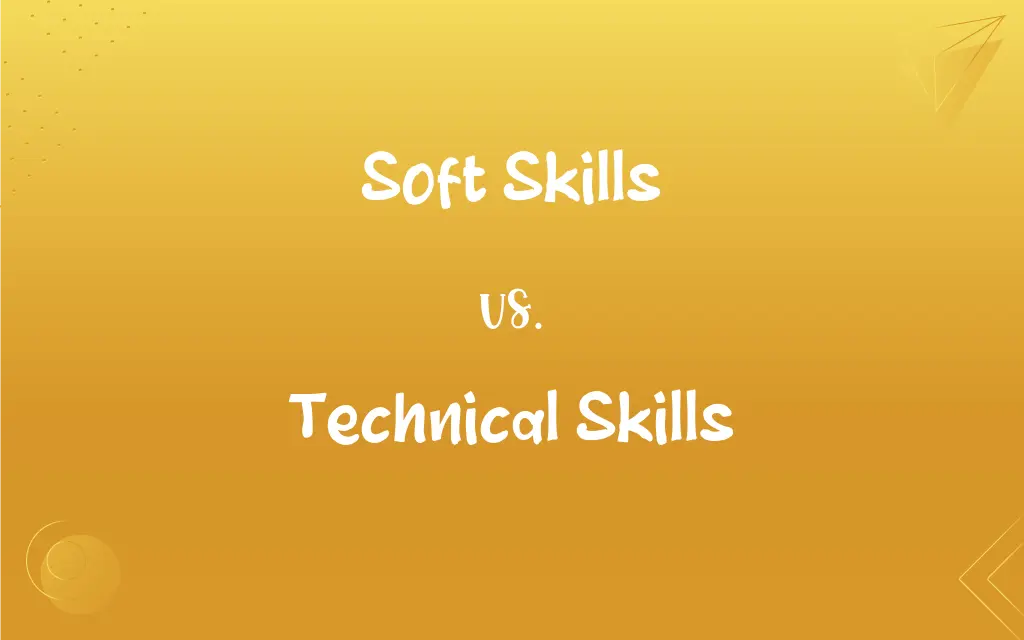Soft Skills vs. Technical Skills: What's the Difference?
Edited by Aimie Carlson || By Janet White || Published on December 31, 2023
Soft skills are interpersonal and behavioral abilities, while technical skills are specific, teachable abilities related to tasks and processes.

Key Differences
Soft skills encompass personal attributes, communication abilities, and social intelligence, essential for effective interaction and teamwork. Conversely, technical skills are specialized competencies, knowledge, and expertise in specific fields, necessary for performing specific job tasks.
Soft skills include leadership, empathy, and adaptability, emphasizing human interaction and problem-solving, while technical skills involve proficiency in tools, technologies, and procedures, focusing on executing specific, measurable tasks.
Soft skills are universally applicable across various professions and industries, enhancing collaboration and workplace dynamics. Technical skills, however, are often industry-specific, requiring specific training and education to acquire.
The development of soft skills involves behavioral training and real-world experience, aiming to improve emotional intelligence and interpersonal relations. In contrast, acquiring technical skills often involves formal education, training courses, and hands-on practice in a particular domain.
Employers value soft skills for their role in fostering a positive work environment and effective team collaborations, while technical skills are crucial for meeting the specific functional requirements of a job.
ADVERTISEMENT
Comparison Chart
Nature
Interpersonal, Behavioral
Specialized, Task-Oriented
Key Elements
Communication, Empathy
Proficiency in Tools, Technologies
Applicability
Universal across Industries
Industry-Specific
Development Method
Behavioral Training, Experience
Formal Education, Training
Role in Workplace
Enhances Collaboration, Dynamics
Meets Functional Job Requirements
ADVERTISEMENT
Soft Skills and Technical Skills Definitions
Soft Skills
Leadership and management skills important for guiding teams.
His leadership abilities, a part of his soft skills, motivated the team.
Technical Skills
Skills acquired through formal education and training in a specific domain.
He applied his technical skills in data analysis to interpret the report.
Soft Skills
Time management and organizational skills for personal effectiveness.
Her excellent time management, a key soft skill, ensured project success.
Technical Skills
Expertise in scientific, mathematical, or technological subjects.
His technical skills in mathematics enabled complex calculations for the project.
Soft Skills
Emotional intelligence skills aiding in empathy and relationship-building.
His ability to understand client needs showcased his soft skills.
Technical Skills
Specialized abilities related to specific tasks in fields like IT, engineering.
His technical skills in programming were crucial for the software development.
Soft Skills
Interpersonal skills facilitating effective communication and teamwork.
Her soft skills were evident in how she resolved the team conflict.
Technical Skills
Proficiency in using tools, software, or methodologies specific to a job.
Her technical skills in graphic design software produced stunning visuals.
Soft Skills
Adaptability and problem-solving skills crucial for dynamic work environments.
She used her soft skills to adapt quickly to the new project requirements.
Technical Skills
Practical abilities to operate machinery or equipment in industries.
Her technical skills in operating the machinery improved production efficiency.
FAQs
Can soft skills be learned?
Yes, soft skills can be developed through practice and real-world experiences.
What are technical skills?
Technical skills are specific, teachable abilities related to performing job tasks.
What are soft skills?
Soft skills are personal attributes and interpersonal skills crucial in the workplace.
How are technical skills acquired?
Technical skills are acquired through education, training, and hands-on experience.
Are technical skills only related to technology?
No, technical skills can relate to various fields, including but not limited to technology.
Are technical skills job-specific?
Yes, technical skills are often specific to certain jobs or industries.
Do employers value soft skills?
Yes, employers highly value soft skills for effective teamwork and communication.
Is coding a technical skill?
Yes, coding is a technical skill relevant in many technology-related jobs.
Can soft skills improve career prospects?
Absolutely, strong soft skills can significantly enhance career growth and opportunities.
Do soft skills contribute to customer service?
Absolutely, soft skills are crucial in providing excellent customer service.
Do technical skills require continuous updating?
Yes, staying current in technical skills often requires ongoing learning and updating.
Do soft skills help in leadership roles?
Yes, soft skills like leadership and communication are vital in leadership roles.
Is project management a technical skill?
Project management is a blend of both technical skills (planning, budgeting) and soft skills (leadership, communication).
Is emotional intelligence a soft skill?
Yes, emotional intelligence is a key component of soft skills.
How do soft skills impact teamwork?
Soft skills greatly improve teamwork through better communication and collaboration.
Do technical skills include problem-solving?
Yes, but in a more specialized, task-oriented context compared to the broader approach of soft skills.
Are technical skills limited to hands-on tasks?
No, they also include theoretical knowledge and understanding of specific subjects.
Can soft skills be measured?
Soft skills are more subjective and harder to measure than technical skills.
Are technical skills more important than soft skills?
Both are important; technical skills for job competence and soft skills for interpersonal effectiveness.
Can soft skills be taught in a classroom?
They can be introduced in a classroom, but are best developed through real-life interactions and experiences.
About Author
Written by
Janet WhiteJanet White has been an esteemed writer and blogger for Difference Wiki. Holding a Master's degree in Science and Medical Journalism from the prestigious Boston University, she has consistently demonstrated her expertise and passion for her field. When she's not immersed in her work, Janet relishes her time exercising, delving into a good book, and cherishing moments with friends and family.
Edited by
Aimie CarlsonAimie Carlson, holding a master's degree in English literature, is a fervent English language enthusiast. She lends her writing talents to Difference Wiki, a prominent website that specializes in comparisons, offering readers insightful analyses that both captivate and inform.






































































